2011年12月大学英语六级真题
2011年12月大学英语六级真题答案
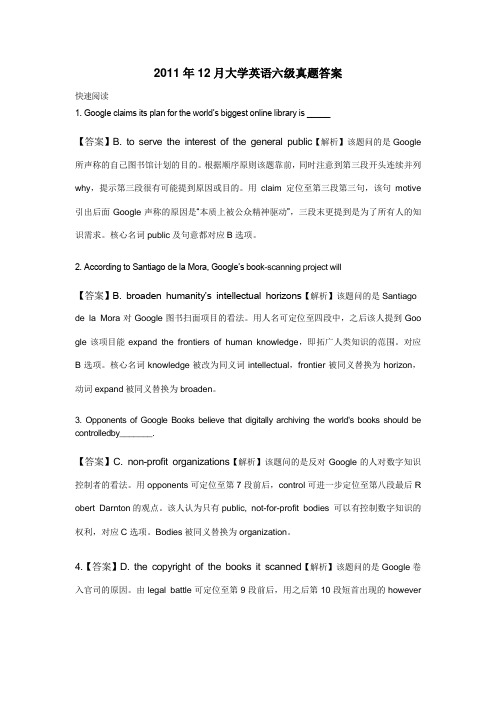
2011年12月大学英语六级真题答案快速阅读1. Google claims its plan for the world’s biggest online library is _____【答案】B. to serve the interest of the general public【解析】该题问的是Google 所声称的自己图书馆计划的目的。
根据顺序原则该题靠前,同时注意到第三段开头连续并列why,提示第三段很有可能提到原因或目的。
用claim定位至第三段第三句,该句motive 引出后面Google声称的原因是“本质上被公众精神驱动”,三段末更提到是为了所有人的知识需求。
核心名词public及句意都对应B选项。
2. According to Santiago de la Mora, Google’s book-scanning project will【答案】B. broaden humanity’s intellectual horizons【解析】该题问的是Santiago de la Mora对Google图书扫面项目的看法。
用人名可定位至四段中,之后该人提到Goo gle该项目能expand the frontiers of human knowledge,即拓广人类知识的范围。
对应B选项。
核心名词knowledge被改为同义词intellectual,frontier被同义替换为horizon,动词expand被同义替换为broaden。
3. Opponents of Google Books believe that digitally archiving the world's books should be controlledby_______.【答案】C. non-profit organizations【解析】该题问的是反对Google的人对数字知识控制者的看法。
2011年12月英语六级(CET6)真题
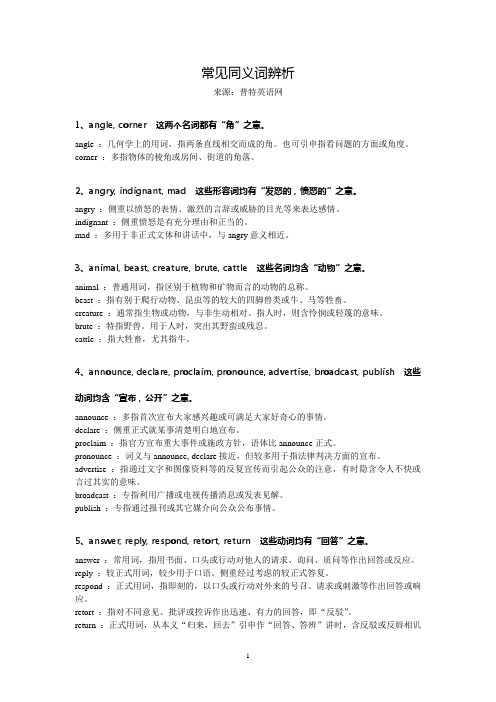
常见同义词辨析来源:普特英语网1、angle, corner 这两个名词都有“角”之意。
angle :几何学上的用词,指两条直线相交而成的角。
也可引申指看问题的方面或角度。
corner :多指物体的棱角或房间、街道的角落。
2、angry, indignant, mad 这些形容词均有“发怒的,愤怒的”之意。
angry :侧重以愤怒的表情、激烈的言辞或威胁的目光等来表达感情。
indignant :侧重愤怒是有充分理由和正当的。
mad :多用于非正式文体和讲话中,与angry意义相近。
3、animal, beast, creature, brute, cattle 这些名词均含“动物”之意。
animal :普通用词,指区别于植物和矿物而言的动物的总称。
beast :指有别于爬行动物、昆虫等的较大的四脚兽类或牛、马等牲畜。
creature :通常指生物或动物,与非生动相对。
指人时,则含怜悯或轻蔑的意味。
brute :特指野兽。
用于人时,突出其野蛮或残忍。
cattle :指大牲畜,尤其指牛。
4、announce, declare, proclaim, pronounce, advertise, broadcast, publish 这些动词均含“宣布,公开”之意。
announce :多指首次宣布大家感兴趣或可满足大家好奇心的事情。
declare :侧重正式就某事清楚明白地宣布。
proclaim :指官方宣布重大事件或施政方针,语体比announce正式。
pronounce :词义与announce, declare接近,但较多用于指法律判决方面的宣布。
advertise :指通过文字和图像资料等的反复宣传而引起公众的注意,有时隐含令人不快或言过其实的意味。
broadcast :专指利用广播或电视传播消息或发表见解。
publish :专指通过报刊或其它媒介向公众公布事情。
5、answer, reply, respond, retort, return 这些动词均有“回答”之意。
2011年12月英语6级真题、答案及详解 完整版
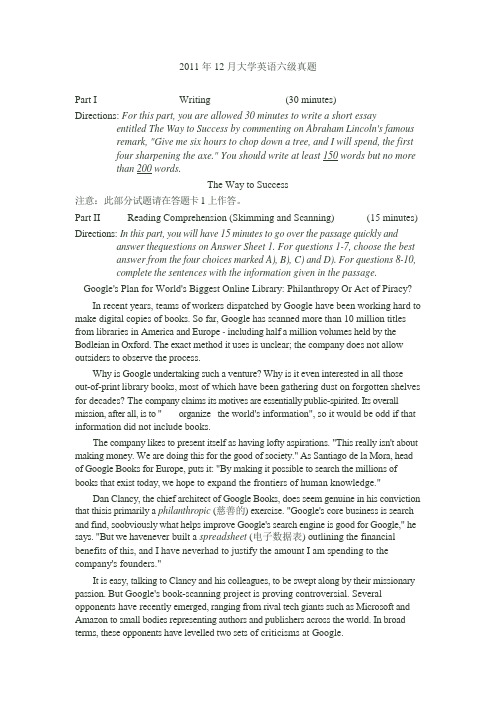
2011年12月大学英语六级真题Part I Writing (30 minutes)Directions: For this part, you are allowed 30 minutes to write a short essay entitled The Way to Success by commenting on Abraham Lincoln's famousremark, "Give me six hours to chop down a tree, and I will spend, the firstfour sharpening the axe." You should write at least 150 words but no morethan 200 words.The Way to Success注意:此部分试题请在答题卡1上作答。
Part II Reading Comprehension (Skimming and Scanning) (15 minutes) Directions: In this part, you will have 15 minutes to go over the passage quickly and answer thequestions on Answer Sheet 1. For questions 1-7, choose the bestanswer from the four choices marked A), B), C) and D). For questions 8-10,complete the sentences with the information given in the passage.Google's Plan for World's Biggest Online Library: Philanthropy Or Act of Piracy?In recent years, teams of workers dispatched by Google have been working hard to make digital copies of books. So far, Google has scanned more than 10 million titles from libraries in America and Europe - including half a million volumes held by the Bodleian in Oxford. The exact method it uses is unclear; the company does not allow outsiders to observe the process.Why is Google undertaking such a venture? Why is it even interested in all those out-of-print library books, most of which have been gathering dust on forgotten shelves for decades? The company claims its motives are essentially public-spirited. Its overall mission, after all, is to " organize the world's information", so it would be odd if that information did not include books.The company likes to present itself as having lofty aspirations. "This really isn't about making money. We are doing this for the good of society." As Santiago de la Mora, head of Google Books for Europe, puts it: "By making it possible to search the millions of books that exist today, we hope to expand the frontiers of human knowledge."Dan Clancy, the chief architect of Google Books, does seem genuine in his conviction that thisis primarily a philanthropic (慈善的) exercise. "Google's core business is search and find, soobviously what helps improve Google's search engine is good for Google," he says. "But we havenever built a spreadsheet (电子数据表) outlining the financial benefits of this, and I have neverhad to justify the amount I am spending to the company's founders."It is easy, talking to Clancy and his colleagues, to be swept along by their missionary passion. But Google's book-scanning project is proving controversial. Several opponents have recently emerged, ranging from rival tech giants such as Microsoft and Amazon to small bodies representing authors and publishers across the world. In broad terms, these opponents have levelled two sets of criticisms at Google.First, they have questioned whether the primary responsibility for digitally archiving the world's books should be allowed to fall to a commercial company. In a recent essay in the New YorkReview of Books, Robert Darnton, the head of Harvard University's library, argued that because such books are a common resource – the possession of us all – only public, not-for-profit bodiesshould be given the power to control them.The second related criticism is that Google's scanning of books is actually illegal. This allegation has led to Google becoming mired in (陷入) a legal battle whose scope and complexity makes the Jarndyce and Jarndyce case in Charles Dickens' Bleak House look straightforward.At its centre, however, is one simple issue: that of copyright. The inconvenient fact about most books, to which Google has arguably paid insufficient attention, is that they are protected by copyright. Copyright laws differ from country to country, but in general protection extends for the duration of an author's life and for a substantial period afterwards, thus allowing the author's heirs to benefit. (In Britain and America, thispost-death period is 70 years.) This means, of course, that almost all of the books published in the 20th century are still under copyright – and the last century saw more books published than in all previous centuries combined. Of the roughly 40million books in US libraries, for example, an estimated 32 million are in copyright. Of these, some 27 million are out of print.Outside the US, Google has made sure only to scan books that are out of copyright and thus in the "public domain" (works such as the Bodleian's first editionof Middlemarch, which anyone canread for free on Google Books Search).But, within the US, the company has scanned both in-copyright and out-of-copyright works. Inits defence, Google points out that it displays only small segments of books that are in copyright– arguing that such displays are "fair use". But critics allege that by making electronic copies of these books without first seeking the permission of copyright holders, Google has committed piracy."The key principle of copyright law has always been that works can be copied only once authors have expressly given their permission," says Piers Blofeld, of the Sheil Land literary agency in London. "Google has reversed this – it has simply copied all these works without bothering toask."In 2005, the Authors Guild of America, together with a group of US publishers, launched a class action suit (集团诉讼) against Google that, after more than two years of negotiation, endedwith an announcement last October that Google and the claimants had reached an out-of-courtsettlement. The full details are complicated - the text alone runs to 385 pages– and trying tosummarise it is no easy task. "Part of the problem is that it is basically incomprehensible," saysBlofeld, one of the settlement's most vocal British critics.Broadly, the deal provides a mechanism for Google to compensate authors and publishers whose rights it has breached (including giving them a share of any future revenue it generates fromtheir works). In exchange for this, the rights holders agree not to sue Google in future.This settlement hands Google the power - but only with the agreement of individual rights holders – to exploit its database of out-of-print books. It can include them in subscription deals sold to libraries or sell them individually under a consumer licence. It is these commercial provisions that are proving the settlement's most controversial aspect.Critics point out that, by giving Google the right to commercially exploit its database, thesettlement paves the way for a subtle shift in the company's role from provider of information to seller. "Google's business model has always been to provide information for free, and sell advertising on the basis of the traffic this generates," points out James Grimmelmann, associate professor at New York Law School. Now, he says, because of the settlement's provisions, Google could become a significant force in bookselling.Interest in this aspect of the settlement has focused on "orphan" works, where there is noknown copyright holder – these make up an estimated 5-10% of the books Google has scanned. Under the settlement, when no rights holders come forward and register their interest in a work, commercial control automatically reverts to Google. Google will be able to display up to 20% oforphan works for free, include them in its subscription deals to libraries and sell them to individual buyers under the consumer licence.It is by no means certain that the settlement will be enacted (执行) – it is the subject of afairness hearing in the US courts. But if it is enacted, Google will in effect be off the hook as far as copyright violations in the US are concerned. Many people are seriously concerned by this - and the company is likely to face challenges in other courts around the world.No one knows the precise use Google will make of the intellectual property it has gained byscanning the world's library books, and the truth, as Gleick, an American science writer and member of the Authors Guild, points out, is that the company probably doesn't even know itself. But what is certain is that, in some way or other, Google's entrance into digital bookselling will have a significant impact on the book world in the years to come.注意:此部分试题请在答题卡1上作答。
2011年12月大学英语六级真题

First,they have questioned whether the primary responsibility for digitally archiving theworld's books should be allowed to fall to a commercial company.In a recent essay in the New York Review of Books,Robert Darnton,the head of Harvard University's library,argued that because such books are a common resource–the possession of us all–only public,not-for-profit bodies should be given the power to control them.The second related criticism is that Google's scanning of books is actually illegal.This allegation has led to Google becoming mired in(陷入)a legal battle whose scope and complexity makes the Jarndyce and Jarndyce case in Charles Dickens'Bleak House look straightforward.At its centre,however,is one simple issue:that of copyright.The inconvenient fact aboutmost books,to which Google has arguably paid insufficient attention,is that they are protected by copyright.Copyright laws differ from country to country,but in general protection extends forthe duration of an author's life and for a substantial period afterwards,thus allowing the author's heirs to benefit.(In Britain and America,this post-death period is70years.)This means,of course, that almost all of the books published in the20th century are still under copyright–and the last century saw more books published than in all previous centuries combined.Of the roughly40 million books in US libraries,for example,an estimated32million are in copyright.Of these,some 27million are out of print.Outside the US,Google has made sure only to scan books that are out of copyright and thus in the "public domain"(works such as the Bodleian's first edition of Middlemarch,which anyone can read for free on Google Books Search).But,within the US,the company has scanned both in-copyright and out-of-copyright works.In its defence,Google points out that it displays only small segments of books that are incopyright–arguing that such displays are"fair use".But critics allege that by makingelectronic copies of these books without first seeking the permission of copyright holders,Google has committed piracy."The key principle of copyright law has always been that works can be copied onlyonce authors have expressly given their permission,"says Piers Blofeld,of the Sheil Land literary agency in London."Google has reversed this–it has simply copied all these works without bothering toask."In2005,the Authors Guild of America,together with a group of US publishers,launched a class action suit(集团诉讼)against Google that,after more than two years of negotiation,ended with an announcement last October that Google and the claimants had reached an out-of-court settlement.The full details are complicated-the text alone runs to385pages–and trying to sum arise it is no easy task."Part of the problem is that it is basically incomprehensible,"says Blofeld, one of the settlement's most vocal British critics.Broadly,the deal provides a mechanism for Google to compensate authors and publishers whose rights it has breached(including giving them a share of any future revenue it generates from their works).In exchange for this,the rights holders agree not to sue Google in future.This settlement hands Google the power-but only with the agreement of individual rights holders–to exploit its database of out-of-print books.It can include them in subscription deals soldto libraries or sell them individually under a consumer licence.It is these commercial provisions that are proving the settlement's most controversial aspect.Critics point out that,by giving Google the right to commercially exploit its database,the settlement paves the way for a subtle shift in the company's role from provider of information to seller."Google's business model has always been to provide information for free,and sell advertising on the basis of the traffic this generates,"points out James Grimmelmann,associate professor at New York Law School.Now,he says,because of the settlement's provisions,Google could become a significant force in bookselling.Interest in this aspect of the settlement has focused on"orphan"works,where there is noknown copyright holder–these make up an estimated5-10%of the books Google has scanned.Under the settlement,when no rights holders come forward and register their interest in a work,commercial control automatically reverts to Google.Google will be able to display up to20% of orphan works for free,include them in its subscription deals to libraries and sell them to individual buyers under the consumer licence.It is by no means certain that the settlement will be enacted(执行)–it is the subject of a fairness hearing in the US courts.But if it is enacted,Google will in effect be off the hook as faras copyright violations in the US are concerned.Many people are seriously concerned by this-and the company is likely to face challenges in other courts around the world.No one knows the precise use Google will make of the intellectual property it has gained by scanning the world's library books,and the truth,as Gleick,an American science writer and member of the Authors Guild,points out,is that the company probably doesn't even know itself.But what is certain is that,in some way or other,Google's entrance into digital bookselling will have a significant impact on the book world in the years to come.注意:此部分试题请在答题卡1上作答。
新编2011年12月大学英语六级考试真题与解析

新编2011年12月大学英语六级考试真题与解析Passage OneQuestions 52 to 56 are based on the following passage.What's the one word of advice a well-meaning professional would give to a recent college graduate? China? India? Brazil? How about trade?When the Commerce Department reported last week that the trade deficit in June approached $50 billion, it set off a new round of economic doom saying. Imports, which soared to $200.3 billion in the month, are subtracted in the calculation of gross domestic product. The larger the trade deficit, the smaller the GDP. Should such imbalances continue, pessimists say, they could contribute to slower growth.But there's another way of looking at the trade data. Over the past two years, the figures on imports and exports seem not to signal a double-dip recession –--- a renewed decline in the broad level of economic activity in the United States – but an economic expansion.The rising volume of trade –---- more goods and services shuttling in and out of the United States –--- is good news for many sectors. Companies engaged in shipping, trucking, rail freight, delivery, and logistics (物流) have all been reporting better than expected results. The rising numbers signify growing vitality in foreign markets ----- when we import more stuff, it puts more cash in the hands of people around the world, and U.S. exports are rising because more foreigners have the ability to buy the things we produce and market. The rising tide of trade is also good news for people who work in trade-sensitive businesses, especially those that produce commodities for which global demand sets the price – agricultural goods, mining, metals, oil.And while exports always seem to lag, U.S. companies are becoming more involved in the global economy with each passing month. General Motors sells as many cars in China as in America each month. While that may not do much for imports, it does help GM's balance sheet –----and hence makes the jobs of U.S.-based executives more stable.One great challenge for the U.S. economy is slack domestic consumer demand. Americans are paying down debt, saving more, and spending more carefully. That's to be expected, given what we've been through. But there's a bigger challenge. Can U.S.-based businesses, large and small, figure out how to get a piece of growing global demand? Unless you want to pick up and move to India, or Brazil, or China, the best way to do that is through trade. It may seem obvious, but it's no longer enough simply to do business with our friends and neighbors here at home.Companies and individuals who don't have a strategy to export more, or to get more involved in foreign markets, or to play a role in global trade, are shutting themselves out of the lion's share of economic opportunity in our world.52. How do pessimists interpret the U.S. trade deficit in June?A) It reflects Americans' preference for imported goods.B) It signifies a change in American economic structure.C) It is the result of America's growing focus on domestic market.D) It could lead to slower growth of the national economy.53. What does the author say about the trade data of the past two years?A) It indicates that economic activities in the U.S. have increased.B) It shows that U.S. economy is slipping further into recession.C) It signals decreasing domestic demand for goods and services.D) It reflects the fluctuations in the international market.54. Who particularly benefit from the rising volume of trade?A) People who have expertise in international trade.B) Consumers who favor imported goods and services.C) Producers of agricultural goods and raw materials.D) Retailers dealing in foreign goods and services.55. What is one of the challenges facing the American economy?A) Competition from overseas. C) Slack trade activities.B) People's reluctance to spend. D) Decreasing productivity.56. What is the author's advice to U.S. companies and individuals?A) To import more cheap goods from developing countries.B) To move their companies to where labor is cheaper.C) To increase their market share overseas.D) To be alert to fluctuations in foreign markets.Passage TwoA recurring criticism of the UK's university sector is its perceived weakness in translating new knowledge into new products and services.Recently, the UK National Stem Cell Network warned the UK could lose its place among the world leaders in stem cell research unless adequate funding and legislation could be assured. We should take this concern seriously as universities are keys in the national innovation system.However, we do have to challenge the unthinking complaint that the sector does not do enough in taking ideas to market. The most recent comparative data on the performance of universities and research institutions in Australia, Canada, USA and UK shows that, from a relatively weak starting position, the UK now leads on many indicators of commercialization activity.When viewed at the national level, the policy interventions of the past decade have helped transform the performance of UK universities. Evidence suggests the UK's position is much stronger than in the recent past and is still showing improvement. But national data masks the very large variation in the performance of individual universities. The evidence shows that a large number of universities have fallen off the back of the pack, a few perform strongly and the rest chase the leaders.This type of uneven distribution is not peculiar to the UK and is mirrored across other economies. In the UK, research is concentrated: less than 25% of universities receive 75% of the research funding. These same universities are also the institutions producing the greatest share of PhD graduates, science citations, patents and license income. The effect of policies generating long-term resource concentration has also created a distinctive set of universities which are research-led and commercially active. It seems clear that the concentration of research and commercialization work creates differences between universities.The core objective for universities which are research-led must be to maximize the impact of their research efforts. These universities should be generating the widest range of social, economic and environmental benefits. In return for the scale of investment, they should share their expertise in order to build greater confidence in the sector.Part of the economic recovery of the UK will be driven by the next generation of research commercialization spilling out of our universities. There are three dozen universities in the UK which are actively engaged in advanced research training and commercialization work.If there was a greater coordination of technology transfer offices within regions and a simultaneous investment in the scale and functions of our graduate schools, universities could, and should, play a key role in positioning the UK for the next growth cycle.57. What does the author think of UK universities in terms of commercialization?A) They fail to convert knowledge into money.B) They do not regard it as their responsibility.C) They still have a place among the world leaders.D) They have lost their leading position in many ways.58. What does the author say about the national data on UK universities' performance in commercialization?A) It masks the fatal weaknesses of government policy.B) It does not rank UK universities in a scientific way.C) It does not reflect the differences among universities.D) It indicates their ineffective use of government resources.59. We can infer from Paragraph 5 that "policy interventions" (Line 1, Para. 4) refers to _____.A) government aid to non-research-oriented universitiesB) compulsory cooperation between universities and industriesC) fair distribution of funding for universities and research institutionsD) concentration of resources in a limited number of universities60. What does the author suggest research-led universities do?A) Publicize their research to win international recognition.B) Fully utilize their research to benefit all sectors of society.C) Generously share their facilities with those short of funds.D) Spread their influence among top research institutions.61. How can the university sector play a key role in the UK's economic growth?A) By establishing more regional technology transfer offices.B) By asking the government to invest in technology transfer research.C) By promoting technology transfer and graduate school education.D) By increasing the efficiency of technology transfer agencies.【解析】52. D. 题干中pessimists 对美国六月份贸易赤字的看法。
2011年12月英语六级真题及答案
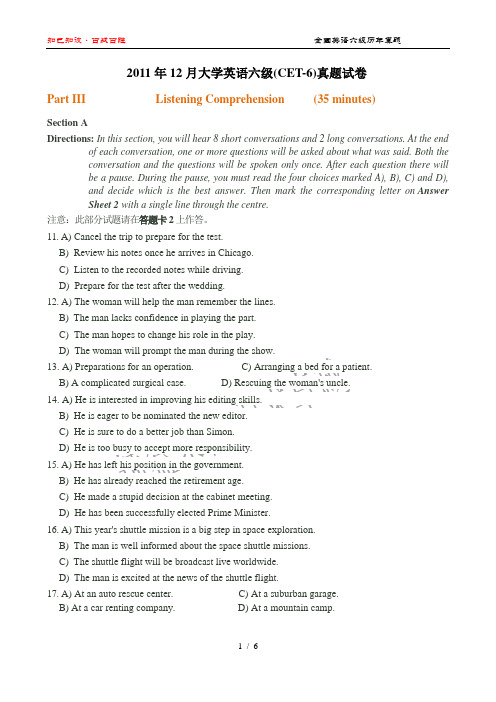
2011年12月大学英语六级(CET-6)真题试卷Part III Listening Comprehension (35 minutes)Section ADirections:In this section, you will hear 8 short conversations and 2 long conversations. At the end of each conversation, one or more questions will be asked about what was said. Both theconversation and the questions will be spoken only once. After each question there willbe a pause. During the pause, you must read the four choices marked A), B), C) and D),and decide which is the best answer. Then mark the corresponding letter on AnswerSheet 2 with a single line through the centre.注意:此部分试题请在答题卡2上作答。
11. A) Cancel the trip to prepare for the test.B) Review his notes once he arrives in Chicago.C) Listen to the recorded notes while driving.D) Prepare for the test after the wedding.12. A) The woman will help the man remember the lines.B) The man lacks confidence in playing the part.C) The man hopes to change his role in the play.D) The woman will prompt the man during the show.13. A) Preparations for an operation. C) Arranging a bed for a patient.B) A complicated surgical case. D) Rescuing the woman's uncle.14. A) He is interested in improving his editing skills.B) He is eager to be nominated the new editor.C) He is sure to do a better job than Simon.D) He is too busy to accept more responsibility.15. A) He has left his position in the government.B) He has already reached the retirement age.C) He made a stupid decision at the cabinet meeting.D) He has been successfully elected Prime Minister.16. A) This year's shuttle mission is a big step in space exploration.B) The man is well informed about the space shuttle missions.C) The shuttle flight will be broadcast live worldwide.D) The man is excited at the news of the shuttle flight.17. A) At an auto rescue center. C) At a suburban garage.B) At a car renting company. D) At a mountain camp.18. A) He got his speakers fixed. C) He listened to some serious musicB) He went shopping with the woman. D) He bought a stereo system.Questions 19 to 21 are based on the conversation you have just heard.19. A) Providing aid to the disabled.B) Printing labels for manufactured goods.C) Promoting products for manufacturers.D) Selling products made for left-handers.20. A) Most of them are specially made for his shop.B) All of them are manufactured in his own plant.C) The kitchenware in his shop is of unique design.D) About half of them are unavailable on the market.21. A) They specialise in one product only. C) They run chain stores in central London.B) They have outlets throughout Britain. D) They sell by mail order only.Questions 22 to 25 are based on the conversation you have just heard.22. A) It publishes magazines. C) It runs sales promotion campaigns.B) It sponsors trade fairs. D) It is engaged in product design.23. A) The ad specifications had not been given in detail.B) The woman's company made last-minute changes.C) The woman's company failed to make payments in time.D) Organising the promotion was really time-consuming.24. A) Extend the campaign to next year. C) Run another four-week campaign.B) Cut the fee by half for this year. D) Give her a 10 percent discount.25. A) Stop negotiating for the time being. C) Reflect on their respective mistakesB) Calm down and make peace. D) Improve their promotion plans.Section BDirections:In this section, you will hear 3 short passages. At the end of each passage, you willhear some questions. Both the passage and the questions will be spoken only once.After you heara question, you must choose the best answer from the four choices marked A), B), C) andD). Then mark the corresponding letter on Answer Sheet 2 with a single line through thecentre.注意:此部分试题请在答题卡2上作答。
2011年12月英语六级(CET6)真题
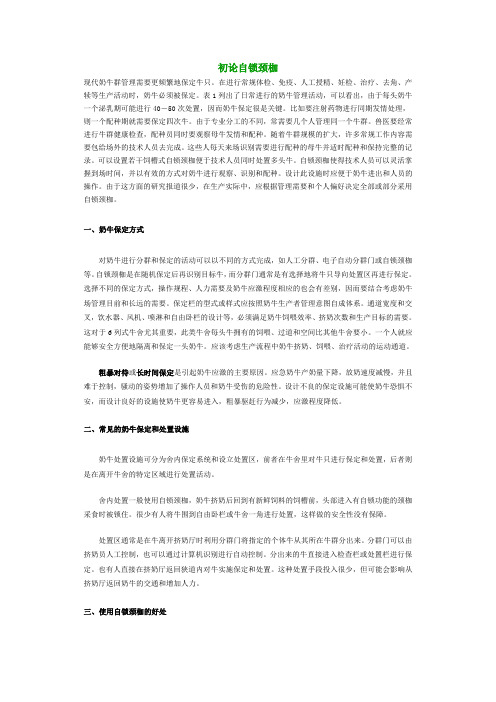
初论自锁颈枷现代奶牛群管理需要更频繁地保定牛只。
在进行常规体检、免疫、人工授精、妊检、治疗、去角、产犊等生产活动时,奶牛必须被保定。
表1列出了日常进行的奶牛管理活动,可以看出,由于每头奶牛一个泌乳期可能进行40-50次处置,因而奶牛保定很是关键。
比如要注射药物进行同期发情处理,则一个配种期就需要保定四次牛。
由于专业分工的不同,常需要几个人管理同一个牛群。
兽医要经常进行牛群健康检查,配种员同时要观察母牛发情和配种。
随着牛群规模的扩大,许多常规工作内容需要包给场外的技术人员去完成。
这些人每天来场识别需要进行配种的母牛并适时配种和保持完整的记录。
可以设置若干饲槽式自锁颈枷便于技术人员同时处置多头牛。
自锁颈枷使得技术人员可以灵活掌握到场时间,并以有效的方式对奶牛进行观察、识别和配种。
设计此设施时应便于奶牛进出和人员的操作。
由于这方面的研究报道很少,在生产实际中,应根据管理需要和个人偏好决定全部或部分采用自锁颈枷。
一、奶牛保定方式对奶牛进行分群和保定的活动可以以不同的方式完成,如人工分群、电子自动分群门或自锁颈枷等。
自锁颈枷是在随机保定后再识别目标牛,而分群门通常是有选择地将牛只导向处置区再进行保定。
选择不同的保定方式,操作规程、人力需要及奶牛应激程度相应的也会有差别,因而要结合考虑奶牛场管理目前和长远的需要。
保定栏的型式或样式应按照奶牛生产者管理意图自成体系。
通道宽度和交叉,饮水器、风机、喷淋和自由卧栏的设计等,必须满足奶牛饲喂效率、挤奶次数和生产目标的需要。
这对于6列式牛舍尤其重要,此类牛舍每头牛拥有的饲喂、过道和空间比其他牛舍要小。
一个人就应能够安全方便地隔离和保定一头奶牛。
应该考虑生产流程中奶牛挤奶、饲喂、治疗活动的运动通道。
粗暴对待或长时间保定是引起奶牛应激的主要原因。
应急奶牛产奶量下降,放奶速度减慢,并且难于控制,骚动的姿势增加了操作人员和奶牛受伤的危险性。
设计不良的保定设施可能使奶牛恐惧不安,而设计良好的设施使奶牛更容易进入,粗暴驱赶行为减少,应激程度降低。
2011年12月英语六级(CET6)真题

1. Their claims to damages have not been convincingly ______ .A refutedB overwhelmedC depressedD intimidated正确答案:A答案详解:[译文] 他们要求的损失赔偿还没有被令人信服地驳倒。
[注释] 难词辨义。
refute 意为“反驳,驳斥”;符合题意。
overwhelm 意为“制服,压服”;depress 意为“使沮丧”;intimidate 意为“胁迫”。
2. Please don't _____ too much on the painful memories. Everything will be all right.A hesitateB lingerC retainD dwell正确答案:D答案详解:[译文] 请不要总想着这些令人痛苦的记忆。
一切会好起来的。
[注释] 难词辨义。
dwell on/upon 意为“凝思,详述;老是想着”,与题意吻合。
hesitate 意为“犹豫”;linger 意为“徘徊,逗留”;retain 意为“保持,保有”。
3. The jobs of wildlife technicians and biologists seemed ______ to him, but one day he discovered their difference.A identicalB verticalC parallelD specific您所选答案:正确答案:A答案详解:[译文] 对他来说,野生动植物技师和生物学家的工作是完全相同的,但有一天他发现了他们的差异。
[注释] 难词辨义。
identical 意为“完全相同的,等同的”,符合题意。
vertical 意为“垂直的”;paralled 意为“类似的;平行的”;specific 意为“明确的,具体的”。
4. Mary became ______ homewsick and critical of the United States, so she fled from her home in west Bloomfield to her hometown in Austria.A completelyB sincerelyC absolutelyD increasingly您所选答案:正确答案:D答案详解:[译文] 玛丽越来越想家,看不惯美国,所以她从西布鲁姆菲德飞回了奥地利的家乡。
- 1、下载文档前请自行甄别文档内容的完整性,平台不提供额外的编辑、内容补充、找答案等附加服务。
- 2、"仅部分预览"的文档,不可在线预览部分如存在完整性等问题,可反馈申请退款(可完整预览的文档不适用该条件!)。
- 3、如文档侵犯您的权益,请联系客服反馈,我们会尽快为您处理(人工客服工作时间:9:00-18:30)。
正保远程教育旗下品牌网站美国纽交所上市公司(NYSE:DL)
外语教育网外语学习的网上乐园
2011年12月大学英语六级真题
Part I:Writing (30 minutes)
Directions:For this part, you are allowed 30 minutes to write a short essay entitled The Way to Success by commenting on Abraham Lincoln's famous remark, "Give me six hours to chop down a tree, and I will spend, the first four sharpening the axe." You should write at least 150 words but no more than 200 words.
The Way to Success
注意:此部分试题请在答题卡1上作答。
Part II Reading Comprehension (Skimming and Scanning) (15 minutes)
Directions:In this part, you will have 15 minutes to go over the passage quickly and answer thequestions on Answer Sheet
1. For questions 1-7, choose the best answer from the four choices marked A), B), C) and D). For questions
8-10, complete the sentences with the information given in the passage.
Google's Plan for World's Biggest Online Library: Philanthropy Or Act of Piracy?
In recent years, teams of workers dispatched by Google have been working hard to make digital copies of books. So far, Google has scanned more than 10 million titles from libraries in America and Europe - including half a million volumes held by the Bodleian in Oxford. The exact method it uses is unclear; the company does not allow outsiders to observe the process.
Why is Google undertaking such a venture? Why is it even interested in all those out-of-printlibrary books, most of which have been gathering dust on forgotten shelves for decades? Thecompany claims its motives are essentially
public-spirited. Its overall mission, after all, is to "organise the world's information", so it would be odd if that information did not include books.
The company likes to present itself as having lofty aspirations. "This really isn't about making money. We are doing this for the good of society." As Santiago de la Mora, head of Google Books for Europe, puts it: "By making it possible to search the millions of books that exist today, we hope to expand the frontiers of human knowledge."
Dan Clancy, the chief architect of Google Books, does seem genuine in his conviction that thisis primarily
a philanthropic (慈善的) exercise. "Google's core business is search and find, soobviously what helps improve Google's search engine is good for Google," he says. "But we havenever built a spreadsheet (电子数据表) outlining the financial benefits of this, and I have neverhad to justify the amount I am spending to the company's founders."
It is easy, talking to Clancy and his colleagues, to be swept along by their missionary passion. But Google's
book-scanning project is proving controversial. Several opponents have recently emerged, ranging from rival tech giants such as Microsoft and Amazon to small bodies representing authors and publishers across the world. In broad terms, these opponents have levelled two sets of criticisms at Google.
First, they have questioned whether the primary responsibility for digitally archiving the world's books should be allowed to fall to a commercial company. In a recent essay in the New YorkReview of Books, Robert Darnton, the head of Harvard University's library, argued that because such books are a common resource – the possession of us all – only public,
not-for-profit bodiesshould be given the power to control them.
The second related criticism is that Google's scanning of books is actually illegal. This allegation has led to Google becoming mired in (陷入) a legal battle whose scope and complexity makes the Jarndyce and Jarndyce case in Charles Dickens' Bleak House look straightforward.。
